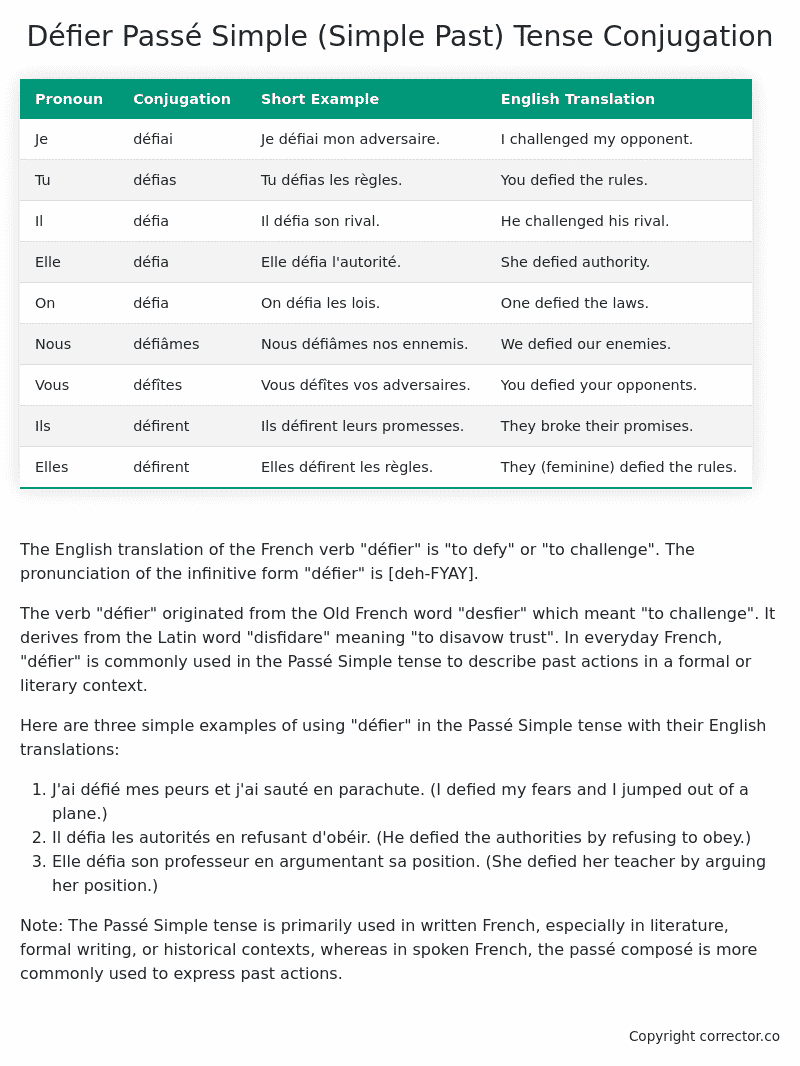Passé Simple (Simple Past) Tense Conjugation of the French Verb défier
Introduction to the verb défier
The English translation of the French verb “défier” is “to defy” or “to challenge”. The pronunciation of the infinitive form “défier” is [deh-FYAY].
The verb “défier” originated from the Old French word “desfier” which meant “to challenge”. It derives from the Latin word “disfidare” meaning “to disavow trust”. In everyday French, “défier” is commonly used in the Passé Simple tense to describe past actions in a formal or literary context.
Here are three simple examples of using “défier” in the Passé Simple tense with their English translations:
- J’ai défié mes peurs et j’ai sauté en parachute. (I defied my fears and I jumped out of a plane.)
- Il défia les autorités en refusant d’obéir. (He defied the authorities by refusing to obey.)
- Elle défia son professeur en argumentant sa position. (She defied her teacher by arguing her position.)
Note: The Passé Simple tense is primarily used in written French, especially in literature, formal writing, or historical contexts, whereas in spoken French, the passé composé is more commonly used to express past actions.
Table of the Passé Simple (Simple Past) Tense Conjugation of défier
| Pronoun | Conjugation | Short Example | English Translation |
|---|---|---|---|
| Je | défiai | Je défiai mon adversaire. | I challenged my opponent. |
| Tu | défias | Tu défias les règles. | You defied the rules. |
| Il | défia | Il défia son rival. | He challenged his rival. |
| Elle | défia | Elle défia l’autorité. | She defied authority. |
| On | défia | On défia les lois. | One defied the laws. |
| Nous | défiâmes | Nous défiâmes nos ennemis. | We defied our enemies. |
| Vous | défîtes | Vous défîtes vos adversaires. | You defied your opponents. |
| Ils | défirent | Ils défirent leurs promesses. | They broke their promises. |
| Elles | défirent | Elles défirent les règles. | They (feminine) defied the rules. |
Other Conjugations for Défier.
Le Present (Present Tense) Conjugation of the French Verb défier
Imparfait (Imperfect) Tense Conjugation of the French Verb défier
Passé Simple (Simple Past) Tense Conjugation of the French Verb défier (You’re reading it right now!)
Passé Composé (Present Perfect) Tense Conjugation of the French Verb défier
Futur Simple (Simple Future) Tense Conjugation of the French Verb défier
Futur Proche (Near Future) Tense Conjugation of the French Verb défier
Plus-que-parfait (Pluperfect) Tense Conjugation of the French Verb défier
Passé Antérieur (Past Anterior) Tense Conjugation of the French Verb défier
Futur Antérieur (Future Anterior) Tense Conjugation of the French Verb défier
Subjonctif Présent (Subjunctive Present) Tense Conjugation of the French Verb défier
Subjonctif Passé (Subjunctive Past) Tense Conjugation of the French Verb défier
Subjonctif Imparfait (Subjunctive Imperfect) Tense Conjugation of the French Verb défier
Subjonctif Plus-que-parfait (Subjunctive Pluperfect) Tense Conjugation of the French Verb défier
Conditionnel Présent (Conditional Present) Tense Conjugation of the French Verb défier
Conditionnel Passé (Conditional Past) Tense Conjugation of the French Verb défier
Conditionnel Passé II (Conditional Past II) Tense Conjugation of the French Verb défier
L’impératif Présent (Imperative Present) Tense Conjugation of the French Verb défier
L’impératif Passé (Imperative Past) Tense Conjugation of the French Verb défier
L’infinitif Présent (Infinitive Present) Tense Conjugation of the French Verb défier
L’infinitif Passé (Infinitive Past) Tense Conjugation of the French Verb défier
Le Participe Présent (Present Participle) Tense Conjugation of the French Verb défier
Le Participe Passé (Past Participle) Tense Conjugation of the French Verb défier
Struggling with French verbs or the language in general? Why not use our free French Grammar Checker – no registration required!
Get a FREE Download Study Sheet of this Conjugation 🔥
Simply right click the image below, click “save image” and get your free reference for the défier Passé Simple tense conjugation!

Défier – About the French Passé Simple (Simple Past) Tense
Formation
Usage
Narration
Historical Context
Interactions with other tenses
Passé Composé
Imparfait
Conditional and Subjunctive
Summary
I hope you enjoyed this article on the verb défier. Still in a learning mood? Check out another TOTALLY random French verb conjugation!


